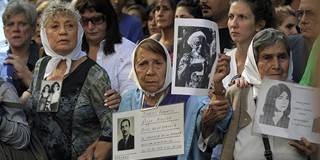In Latin America and elsewhere, women, especially mothers of victims of violence, are constantly at the forefront of human-rights activism. Where state institutions or elected officials fail to take action against abuses, these women have filled a vacuum, challenging traditional gender roles in the process.
WASHINGTON, DC – “We were seeking justice. We wanted to prevent disappearance, for it to end. Unfortunately, I still see girls disappearing. I don’t want to be negative, but I don’t know when this will stop,” said Paula Flores of Juárez, Mexico, on July 3, 2016, 18 years after the disappearance and murder of her daughter, María Sagrario González Flores.
Women like Flores, especially mothers of victims of violence, are constantly at the forefront of human-rights activism on issues like forced disappearance, femicide, and abuses by the military. Where state institutions or elected officials fail to take action against such violence, these women have filled a vacuum, challenging traditional gender roles in the process.
Demanding justice in Mexico, a country where 98% of crimes fail to result in convictions, is no easy task. The country’s activist mothers and grandmothers follow in the Latin American tradition of predecessors like the Mothers of the Plaza de Mayo, who in 1977 began to march in front of the presidential palace in Buenos Aires, Argentina, to protest the mass disappearance of children under the military dictatorship. They marched weekly for years, forcing public discussion of human rights abuses under the dictatorship.

WASHINGTON, DC – “We were seeking justice. We wanted to prevent disappearance, for it to end. Unfortunately, I still see girls disappearing. I don’t want to be negative, but I don’t know when this will stop,” said Paula Flores of Juárez, Mexico, on July 3, 2016, 18 years after the disappearance and murder of her daughter, María Sagrario González Flores.
Women like Flores, especially mothers of victims of violence, are constantly at the forefront of human-rights activism on issues like forced disappearance, femicide, and abuses by the military. Where state institutions or elected officials fail to take action against such violence, these women have filled a vacuum, challenging traditional gender roles in the process.
Demanding justice in Mexico, a country where 98% of crimes fail to result in convictions, is no easy task. The country’s activist mothers and grandmothers follow in the Latin American tradition of predecessors like the Mothers of the Plaza de Mayo, who in 1977 began to march in front of the presidential palace in Buenos Aires, Argentina, to protest the mass disappearance of children under the military dictatorship. They marched weekly for years, forcing public discussion of human rights abuses under the dictatorship.